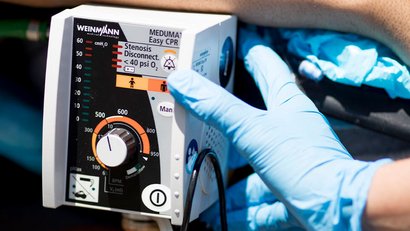Hands-free Ventilation with a Portable Ventilator

A portable ventilator is an essential tool in EMS, designed to deliver controlled, life-sustaining breaths to patients in respiratory distress during both on-scene emergency care and transport.
These compact devices help ensure consistent ventilation instead of using manual methods like bag-valve-mask (BVM) ventilation.
Especially in high-stress, prehospital environments, a portable respiratory ventilator for breathing keeps the hands free and allows providers to focus on other critical tasks while maintaining effective airway support.1
MEDUMAT Easy CPR – WEINMANN's Portable Ventilator
Airway management and ventilation are some of the most critical and challenging tasks EMS providers face in the prehospital setting. Ventilation, in particular, is often one of the most difficult aspects of high-performance CPR.
MEDUMAT Easy CPR is a portable ventilator designed to ensure consistent, reliable ventilation across an array of airway management techniques. It can be used with a basic mask, supraglottic airway, or an endotracheal tube, allowing first responders to achieve more accurate ventilation rates and tidal volumes through controlled, automated support.2
Benefits of WEINMANN’s Portable Ventilator: MEDUMAT Easy CPR
- Easy integration into standard CPR & RSI (Rapid Sequence Intubation) processes
- Simple to use with intuitive controls and predefined settings
- Small and lightweight
- Includes modes for Demand Flow, IPPV, and manual ventilation
- Enables one person to administer two mechanical breaths in less than five seconds via MEDUtrigger
- Consistent ventilation rates and tidal volumes
- Demand flow mode for oxygenation of spontaneously breathing patients
Ventilation Modes: Stabilizing the Airway
The MEDUMAT Easy CPR portable ventilator offers vital support for patients requiring ventilation:
Demand Flow Mode: Patient-triggered Oxygen Inhalation
In Demand flow mode, our portable oxygen ventilator device provides spontaneously breathing patients with 100% oxygen for on-demand inhalation. Oxygen insufflation is performed exclusively with the ventilation mask during inspiration.
Due to a partial negative pressure on the patient’s valve, an inspiration is triggered, causing oxygen to flow until a slight pressure increase interrupts the flow and the patient exhales via the mask’s valve.
Manual Mode: Adjustable Ventilation Rate
With MEDUMAT Easy CPR, EMS field providers can deliver consistent ventilation during patient resuscitation. Using the ventilator's MEDUtrigger, rescuers can manually administer breaths to the patient with the push of a button while using both hands to maintain a good mask seal.


Continuous Mode (IPPV): Ventilation for Patients without Spontaneous Respiration
The continuous mode is used for mandatory volume-controlled ventilation with a fixed minute volume. The minute volume is set via a combined setting of the tidal volume and respiratory rate.
Designed for Out-Of-Hospital Environments
MEDUMAT Easy CPR’s built-in adult and pediatric settings allow you to quickly ventilate at the right rate and volume during critical situations.
Our ambulance portable ventilator enables qualified medical personnel to ventilate patients with a variety of conditions such as traumatic brain injury or cardiac arrest. Furthermore, at less than 1.5 pounds, the MEDUMAT Easy CPR is ideal for any prehospital setting.
Thanks to its small dimensions, our MEDUMAT Easy CPR ventilator can be easily transported and stored. The device can be securely mounted on a stretcher using the mounting kit (retaining plate and fastening strap) and carried / stored in the provided protective transport bag or the standard oxygen bag.
- Dimensions: 3.9 x 5.7 x 3.5 inch (100 x 145 x 90 mm)
- Weight: Just 1.5 lbs (700 g)
- Rugged and robust designed for out-of-hospital use
- Suitable for flight operation: Tested against shock and vibrations in accordance with RTCA/DO 160 G
Technical Details
- Dimensions incl. connections (W x H x D)
3.9 x 5.7 x 3.5 inch
- Weight
1.5 lbs (0.7 kg)
- Temperature
for operation
- 4 °F to 122 °F (-20 °C to +50 °C)for storage
-104 °F to 158 °F (-40 °C to +70 °C)- Oxygen concentration
100% 02
- Supply gas
Medical oxygen
- Oxygen consumption for device operation
0 l/min
- Operating pressure
40 psi to 87 psi (2.7 bar to 6 bar)
- Minimum input flow
40 l/min
- Power supply
- Maintenance-free lithium battery (3.6 V; 5.2 Ah)
- Approx. 100 hours at room temperature and Vt 500 ml., Temperatures below 0°C (32°F) reduce battery life.
- IPPV mode
Ventilation rate
Adjustable from 10 to 25 min-1Tidal volume (Vt)
Adjustable from 65 to 950 mlCorrelation of tidal volume to ventilation frequency
f(min-1) -> Vt(ml) [25;65], [20;100], [15;150], [12;300], [10;500], [10;600], [10;800], [10;950]I:E ratio
1:2 or 1:3Max. ventilation pressure
20 or 45 cmH2O- Manual mode
Tidal volume (Vt)
Adjustable from 65 ml to 950 mlMax. ventilation pressure
20 or 45 cmH2OI:E ratio
1:1- Demand flow mod
Trigger
-0.8 mbar +/- 0.3 mbarPeak flow
≥ 40 l/minSwitch-off pressure
3 cmH2O +/- 0.3 cmH2O- Visual and audio alarms
- Airway pressure high (pAW)
- Airway pressure low (pAW / Apnea)
- Supply pressure low (Battery low)
- Protection from dust and splashing water
IP54
- Meets relevant parts of the standards
DIN EN 794-3, ISO 10651-3, EN 1789, EN 60601-1,
EN 60601-1-2, EN 60601-1-12, RTCA DO-160 G, UL certification- As to electrical shock, fire and mechanical hazards only
ANSI/AAMI ES60601-1 (2005) + AMD 1 (2012), CAN/CSA-C22.2 No, 60601-1 (2014), IEC 60601-1-6:2010, AMD1:2013, IEC 60601-1-8:2006, AMD1:2012, IEC 60601-1-12:2014
Visit our download area for:
- Product information (brochures, images and videos)
- Instructions for use
- Certificates
All rights to design and specification modifications reserved.



1 Weiss SJ, Ernst AA, Jones R, Ong M, Filbrun T, Augustin C, Barnum M, Nick TG. Automatic transport ventilator versus bag valve in the EMS setting: a prospective, randomized trial. South Med J. 2005 Oct;98(10):970-6. doi: 10.1097/01.smj.0000182177.01436.70. PMID: 16295811.








